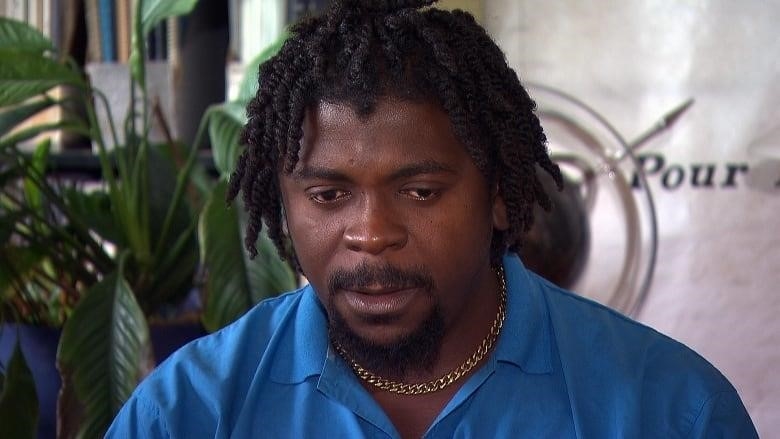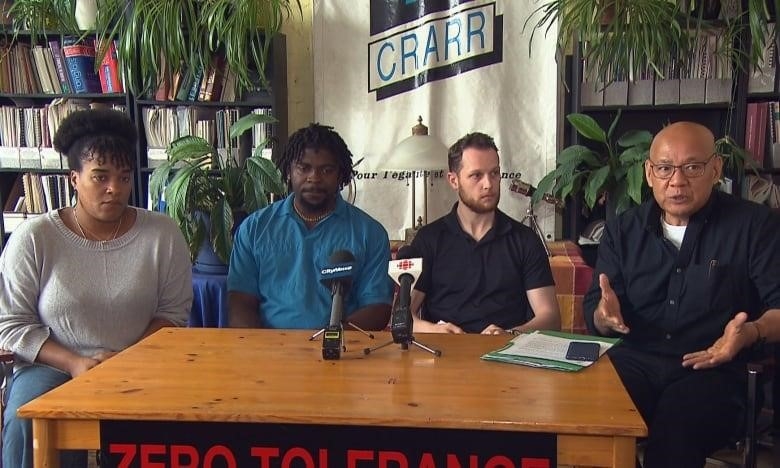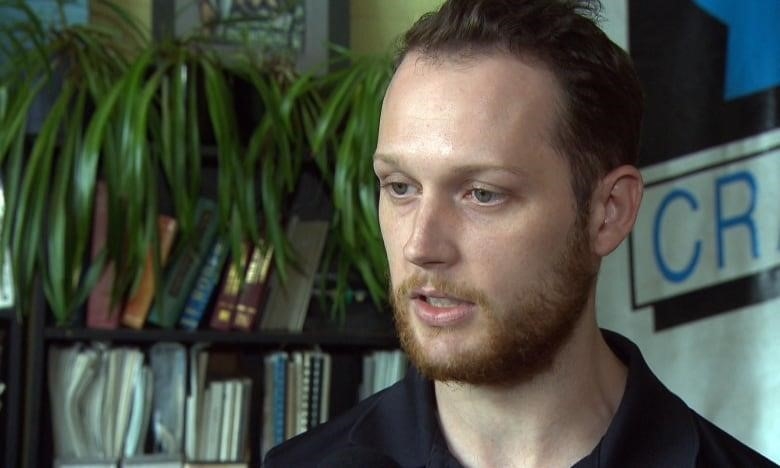
PhD students walked away from the police, but soon they were stuck against a fence
Two PhD students walking home in Montreal’s west end after a night out decided to step into the empty road to avoid a police operation.
Within minutes, they were thrown against a fence in what they say was a violent arrest. One man’s arms were bent so far that they were almost broken, and the other man’s legs were spread so far apart that his pants tore and both knees were hurt.
“It was confusing because I didn’t really understand what was going on,” said Amaechi Okafor, a Black man from Nigeria who moved to Montreal three years ago to get his PhD in history at Concordia University.
Okafor’s voice shook as he talked about what happened on July 22 at 3 a.m. on St-Jacques Street in Notre-Dame-de-Grace (NDG) at a news conference held by the Center for Research-Action on Race Relations (CRARR) on Friday.
“All of a sudden, several officers pinned me to the fence wall and handcuffed my hands,” he said.
On Friday, CRARR said it will help the men file complaints with the police ethics commissioner in Quebec and the human rights and youth rights commission.

The complaints include racial profiling, abuse of power, using too much force, and other violations of civil rights, the group said.
And it all started when the two men chose not to walk through a police operation.
Niemi said, “It just doesn’t make any sense.” “Something has got to change.”
A lot of police blocking the wa
Wade Paul is a friend of Okafor’s who lives in New Brunswick and is part of the St. Mary’s Maliseet First Nation. He is also trying to get a PhD in history, just like Okafor.
He said that getting back to Okafor’s apartment was hard because there were a lot of police cars with their roof lights on and a lot of officers around a person wrapped in an emergency blanket.
They were near the corner of Helen and Rochester Streets, which is in an area with no other corners, making it hard to cross the street.
In section 452 of the province’s Highway Safety Code, it says, “If a pedestrian can’t use the sidewalk, he may walk along the curb on the road after making sure it’s safe to do so.”

Fo Niemi, the executive director of CRARR, said that there were no cars on the road at that time, so it was safe to walk in it.
Paul said that even though the two men walked past the police operation and got back on the sidewalk right away, they heard shouting but didn’t know it was for them.
Paul said, “The next thing I know, a police car is coming up onto the sidewalk and cutting us off.”
“I’m being kind of caught off guard from behind. People are yelling at me. I don’t know what to do. I can’t understand what they are saying because they are all shouting at the same time.”
Paul said that the police were watching Okafor and asking him to show his ID. Paul decided to step in and ask why they needed the ID of his friend. He was also told he had to show his ID because he was jaywalking.
He said he was shocked and wanted to know more about what was going on.
Paul said, “The next thing I know, my arm is being twisted and I’m being violently thrown against a fence.”

CRARR said in a news release that Okafor told police that his legs were too far apart. Since then, his knees have been cracking, and he has been told he has major tissue tears in both of them, according to the release.
The two men said that their pockets, wallets, and phones had been looked through. Both of them were put into the back of a cruiser. Okafor thought he was held for longer than twenty minutes.
Paul said that he saw eight police officers and three police cars at the intervention.
Fined $499 for “getting in the way” of police wor
The two men were eventually given tickets for jaywalking, which cost $49, and for getting in the way of a police officer, which cost $499.
Even though that second fine is expensive, it is not a criminal charge. Instead, it is a violation of Quebec’s Highway Safety Code article 638.1.
Niemi said, “It’s a lot of discretion, so it can be abused.” He also said that his organization often sees this fine given out when people question why they were stopped or ask for more information.
Niemi said that the men are filing complaints and arguing against the tickets. He said that “serious violations” of the police code of ethics had happened to them.
Niemi said, “We have to keep sending the message that some things are no longer okay and can’t be tolerated in this city.”
Niemi said the process is still long, but victims shouldn’t give up because “it’s about reclaiming your space and your freedom…reclaiming your dignity.”
“This kind of intervention could hurt any serious efforts to make new changes and improve relationships, especially with the Black and Indigenous communities here in Montreal,” he said.
The Montreal police said that they won’t say anything about the situation because it could end up in court.
Being Black in Canada is a CBC project that Black Canadians can be proud of. It has more stories about the lives of Black Canadians, from racism against Black people to success stories in the Black community. Here, you can find more stories.

